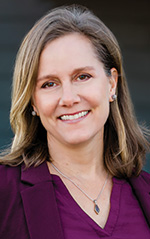Family Member Job Hunting After the Pandemic
A veteran Foreign Service family member explains how the search for employment is changing (and not changing) for FS spouses.
BY DONNA SCARAMASTRA GORMAN
I’m a Foreign Service old-timer. My spouse joined the Foreign Service, and I became an EFM—that’s “eligible family member” for you newbies—back in the last century. It’s always fun to scare the new spouses with stories about the olden days, back before Jeff Bezos created Amazon, when we were just figuring out how to get dial-up internet in our houses, and blogs and FaceTime hadn’t yet been invented.
A lot has changed since then, but one thing still seems to cause the same angst: spouse employment.
When I “joined” the Foreign Service alongside my spouse, the employment landscape was severely limited at post. There was no such thing as “telework,” so we spouses all either chose not to work or we competed for the same few, frequently menial, jobs that were available at post. Although it was rumored to be possible, nobody I knew managed to find paid work outside the mission with any international organizations except the local international schools. Many of us grew bitter about the situation, and some of the people we joined with ended up leaving the Service because of it. We wanted to work, but the State Department, it seemed, didn’t want us.
In the May 1991 FSJ, EFM author Katrina Ecton wrote: “The Foreign Service is wasting a valuable resource: spouses. The scarcity of employment for spouses in the United States and overseas is causing serious morale problems. Jobs are difficult to find, and a career for spouses is almost impossible.”
Since that article was published, the work environment has slowly evolved—too slowly, most spouses would argue—to include a few professional jobs at many posts, and more options to work outside the mission, either on the local economy, with an international organization, or, more occasionally, remotely. More bilateral work agreements have been put in place, giving spouses at more posts the opportunity to work on the local economy. And some U.S. employers have become more open to remote work arrangements, allowing spouses with jobs in the U.S. to take those jobs with them when they move.
When COVID-19 came along in 2020, it shut down many embassies but introduced the business world to the idea of remote workers. Zoom became not just a company but a verb. Google Meets, Microsoft Teams, and other software for connecting became the norm. All of these broad global changes made us wonder: Have any new employment opportunities opened up for EFMs overseas since the outside world went remote in 2020? As the pandemic winds down, turning into more of a low-level nuisance for many, have the remote jobs it spawned also gone away? Or has the employment outlook for spouses changed for good in our post-pandemic world?
EFM Employment by the Numbers
Getting Started: Veteran EFMs Share Their Thoughts
It might feel like you’re alone in your job search frustration. But long-term spouses have some ideas to help you transition into your new work reality.
Create a USAJOBs account. And keep it up to date so you’re ready at the start of the EPAP hiring season or after you return to the United States. You can upload multiple résumés and store important documents such as the SF-50, which proves your work history, making it easier to apply for jobs without re-creating the wheel each time. If you know where you’re moving next, you can set up a job alert for specific positions and locations.
Get that clearance however you can. “Don’t feel like you have to apply to every job just because one is open,” advises DS spouse Jen. But “having a clearance can be a boost, as you can start work faster down the line. It may be worth it to apply for a rover or even part-time admin position just to get the clearance process going.”
Join the FSFRC. Join the Foreign Service Family Reserve Corps (FSFRC) during the next open season, whether or not you’re working. This will help you transition more quickly into new jobs at your next post.
Pursue a passion. Jessica advises spouses to stay flexible and be creative, and to think about trying something new. “I know many spouses who have started their own businesses while overseas—many consulting or coaching. It’s a terrific way to work on your own time and chase a passion.”
Request an informational interview. Several spouses—including this one—suggest that you ask to meet with the head of human resources when you first arrive at post, to make sure they know you are there and are interested in working. Even go so far as to tell everyone you meet that you are looking for work—you never know who is going to know of an interesting job.
—D.S.G.
The Global Community Liaison Office (GCLO, formerly called the Family Liaison Office [FLO]) tracks family member employment over time through their annual Family Member Employment Report (FAMER). The most recent report showed that from fall 2019 to fall 2022, the number of family members overseas increased slightly, from 12,159 to 12,373. In the same period, the number of family members employed inside our overseas missions dropped slightly, from 3,154 in 2019 to 3,124 in 2022.
A whopping 58 percent of family members overseas—7,151 individuals—are unemployed. Of the 5,219 family members who have found jobs, 2,095, or less than half, are employed outside the mission.
Posts in the Bureau of European and Eurasian Affairs (EUR) region are some of the worst places for spouses looking for jobs, with just 19 percent employed inside our EUR missions. By contrast, Bureau of South and Central Asian Affairs (SCA) missions can boast that 46 percent of their spouses are employed inside the mission, with another 14 percent working outside the mission. The Bureau of African Affairs (AF) is close behind, with slightly more than half of its total family members employed—24 percent of them inside the mission.
The FAMER does not include statistics about family members who were employed outside the mission in past years, but it does show that of the 2,095 EFMs employed outside the mission globally in 2022, 764 of them were teleworking, 415 ran a home business or worked as freelancers, 265 held DETO (domestic employee teleworking overseas) positions, and 247 were working in education. The remaining 404 EFMs were classified as “other,” with just 169 working on the local economy.
Beyond the Numbers
Surely some of those 7,151 unemployed family members are choosing not to work. But many others report they are unable to find suitable work in line with their interests and education. And the rise of remote work—though significant, in that fully half of EFMs working outside the mission are teleworking—seems yet to become sufficiently broad-based. Many spouses report that U.S. employers are still wary of hiring overseas spouses, fearing tax, legal, or cybersecurity implications for their businesses.
Spouse employment at the mission is often not a front office or human resources priority. One spouse currently serving at a large European post—certainly large enough to accommodate and even need extra personnel—reports: “I’ve been told no fewer than three times that ‘people get here and don’t want to work,’ but this could not be further from the truth. We get here and can’t work, as there either aren’t jobs, EFMs from other agencies are in them for extended lengths of time, or post does not look for more opportunities (even though I dare say most sections need the help!).”
The Rise of Remote Work
An interconnected world makes it feel like the problem is getting worse. Facebook groups for spouses allow us to see beyond our own front door, and we realize the problem of finding a job is more common than we knew. Yet this connected world also offers new opportunities for some.
Jessica, a lawyer and EFM, has been working remotely since 2013, and she says remote work was more rewarding in the years before COVID-19. “When the pandemic hit, I felt like everyone could work the way I was, but what happened instead was virtual working became a lot more like working in an office,” she says. “People substituted calls for actual work. I was on back-to-back video calls all day, working in an EST time zone while based in Europe, and the work became exhausting. And because it was all on video, I had to be in-seat in front of my computer, giving me so much less flexibility than I had previously.”
Still, says Jessica, the ability to work remotely has allowed her to build her résumé in the field she chose before she got married. “What helped me maintain a 20-year career in law while hopping from country to country was to take ownership over my career. Though I did hold one EFM position at USAID, I largely sought work on my own terms. But I had to do so in a flexible way. I think where it gets really challenging is when spouses have a very specific career track in mind that doesn’t blend with an expat lifestyle.”
The Problems with EPAP
Online Resources for EFMs
According to GCLO Director Gabrielle Hampson: “Every post is different, but generally a quarter of family members at post find work inside an embassy or consulate, and about 17 percent work outside the mission, either teleworking or on the local economy.” Her office offers numerous online resources for job-hunting EFMs.
GCLO manages 20 regionally based global employment advisers who can help family members explore employment and professional development options at post. Family members can access this free resource as they prepare to apply for positions at post or return to the States.
In the last two years, GCLO saw a 2 percent increase in family members teleworking overseas and launched the Telework Overseas Guidance for Family Members page to offer guidance to EFMs interested in pursuing telework options.
The Family Member Employment Report (FAMER) provides detailed information about the employment situation at post. It won’t tell you what jobs are open, but it will give you a sense of whether the posts you are bidding on have a large or small cohort of working spouses.
GCLO’s Professional Development Fellowship Program offers EFM spouses and members of household grants of $1,000 to $2,500 for enrichment activities.
The Network is a subscription newsletter that distributes information about job opportunities to spouses in and around the Washington, D.C., area.
—D.S.G.
The jewel in the EFM job crown is the Expanded Professional Associates Program (EPAP). The program was created in 2008 as a way to fill empty Foreign Service officer slots at post while offering well-paying, professional jobs to qualified family members. There are currently about 400 centrally funded EPAP positions shared across regions, plus up to 50 information resources positions and 30 facilities management positions.
These coveted positions are, however, getting harder to win. Seth, an EFM currently based in Africa, found the process of getting from application to paycheck riddled with frustrations, saying: “The fact that the program is run by Washington, but applicants only have contact with post HR, exacerbates the problem.” As he explains: “Requiring a top-secret security clearance for EFM positions while waiting to initiate the clearance process until after an offer is given is untenable for people on two-year assignments. In my case, I’m losing out on an entire year of my wife’s two-year assignment.”
“What was supposed to be a great program has become a great way of creating strife and divisiveness among EFMs,” says another spouse with experience working in human resources at post. “The qualifications for specialists are still too strict, which makes it hard for anyone to break into a specialist EPAP position and easy for the same people to keep getting them at different posts. It’s a perpetual cycle, and I know of some trying for more than 10 years to get an EPAP position in their field of choice.”
The program “should be run by posts,” this spouse suggests, “and all EPAP positions should have the same year-round hiring flexibility of other family member appointments [FMAs, five-year limited non-career jobs created specifically for qualified spouses at overseas posts].”
What’s the Good News?
It’s not all bad news, even if it sometimes feels that way to those of us trying to secure new jobs every time we move. The Bureau of Global Talent Management (GTM), GCLO, and even Diplomatic Security (DS) have joined forces to try to make things easier for spouses who want to work.
Faster clearances. Several spouses told the FSJ the clearance progress seems to be getting faster. According to a DS spokesperson, they’re not wrong. DS recently overhauled the clearance process, partnering with GTM and the Bureau of Information Resource Management to create a “clearance coordinator program,” which began as a pilot in April 2020 and was phased in worldwide in 2021. Part personnel security specialist and part customer service representative, the clearance coordinator is “engaged across the whole spectrum of security clearance requests, from applicants for employment, to contractors, to student interns.” Using this new model, a DS spokesperson says they’ve reduced the time needed to process clearances from “55 days or even longer” to just two weeks.
Increasing DETOs. Family members can earn noncompetitive eligibility through their overseas employment and use it to land Civil Service positions back in Washington, D.C. But what happens when they’re assigned overseas again? Michael Phillips, deputy assistant secretary for GTM, says many such family members are finding work as a DETO. In the last two years, says Phillips, the number of DETOs grew by 165 percent, with more than 200 Civil Service employees currently teleworking from posts around the world. And, adds Phillips, Civil Service DETOs now receive locality pay under the National Defense Authorization Act for Fiscal Year 2023. (See Amelia Shaw’s article on DETO in this issue.)
Expanding bilateral work agreements. GTM also supports family members who want to work on the local economy (the most common positions, according to Phillips, are in teaching, photography, and consulting). The State Department has 150 bilateral work agreements and de facto arrangements, and Phillips says these agreements provide opportunities for family members to work on the local economy at 84 percent of posts. In the past two years, the State Department has enacted two new bilateral work agreements, one with France and one with Oman.
Educated People Marry Educated People
So what do the other old-timers think of the never-ending quest for spouse employment? One spouse with more than two decades of EFM and Civil Service work experience rolls her eyes and says it’s obvious: “Educated people marry educated people—so we should hire them.”
“I do not know of a single embassy or consulate that would say, ‘Yes, we have enough employees to get the work of the mission done.’” She continues, “And we have talented EFMs sitting around, waiting to work.”
When sharing or linking to FSJ articles online, which we welcome and encourage, please be sure to cite the magazine (The Foreign Service Journal) and the month and year of publication. Please check the permissions page for further details.
Read More...
- “The Reality of Foreign Service Spousal Employment” by Shawn Dorman, The Foreign Service Journal, May 2002
- “Family Member Employment: At Work in the Mission” by Shawn Dorman, The Foreign Service Journal, July/August 2005
- “Patience: The Key to Successful EFM Employment” by Jen Dinoia, The Foreign Service Journal, April 2012
- “Going Back to Work: A Step-by-Step Guide for Foreign Service Spouses” by Anna Sparks, The Foreign Service Journal, September 2015
- “Out in the Cold: How the Hiring Freeze is Affecting Family Member Employment” by Donna Scaramastra Gorman, The Foreign Service Journal, July/August 2017





